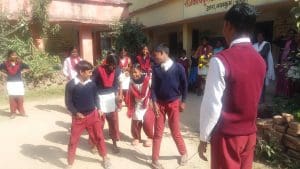
ICRW releases new findings around its Gender Equity Movement in Schools (GEMS)
Media Contact
This week, ICRW released new findings on the Gender Equity Movement in Schools (GEMS) program. Originally piloted in 45 schools in Mumbai, the program has been scaled up and implemented in more than 20,000 schools across that state of Maharashtra, and in Bangladesh and Hanoi. The GEMS program has also been implemented in 80 schools across two districts in Jharkhand, India.
ICRW’s most recent evaluation was designed to better understand the impact of the program on girls’ and boys’ views of gender equity and violence in Jharkhand.
GEMS builds off the idea that the role of schools in perpetuating gender stereotype is often unrecognized, but also that schools present an ideal social institution in which to begin to combat those stereotypes that underpin violent behavior and acceptance of violence. In the GEMS program, teachers are trained both to implement the program and in implementing the program, they begin to uncover their own biases.
 The GEMS curriculum includes 24 sessions, 12 one year and 12 the next year. The first year’s sessions include the topics of gender, violence and bodily changes, and the second year’s session includes relationships, emotions, communication and conflict resolution. Sessions include a range of activities to keep kids engaged, including role-play, games and debates. The GEMS program also contains big group activities, like school plays and speeches during assembly, to engage students.
The GEMS curriculum includes 24 sessions, 12 one year and 12 the next year. The first year’s sessions include the topics of gender, violence and bodily changes, and the second year’s session includes relationships, emotions, communication and conflict resolution. Sessions include a range of activities to keep kids engaged, including role-play, games and debates. The GEMS program also contains big group activities, like school plays and speeches during assembly, to engage students.
To evaluate the effectiveness of the program, ICRW interviewed more than 3,000 boys and girls from the 80 schools where GEMS was implemented. ICRW also conducted in-depth surveys with 60 students from intervention and comparison schools, and spoke to teachers and principals to better understand the impacts of the program.
ICRW evaluated students’ attitudes regarding gender and violence, interaction between boys and girls, communication with teachers, bystander intervention, and perpetration of violence. The evaluation found that the GEMS program led to the following:
- A positive and significant shift in attitudes around gender and violence among students in GEMS schools;
- A decline in support of corporal punishment among students in GEMS schools;
- A decline in acceptance of violence among peers;
- Students felt more comfortable intervening and speaking out against actions like name-calling;
- Improved communication between students, including between boys and girls;
- Enhanced recognition of violence and bystander intervention of different forms of violence; and
- Changes in reported perpetration of violence.
A full list of findings can be found in the report.
Even in GEMS schools, however, there is room for improvement. Students note that while support for corporal punishment is down, it still happens and they often feel powerless to stop it. There was some documented resistance from teachers and parents and time, a precious resource, was sometimes an issue.
To read the report with a full list of research findings and challenges, click here. A video, with interviews from students and teachers talking about the program’s impact on them, can be found here.
